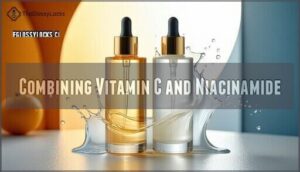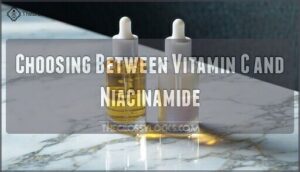This site is supported by our readers. We may earn a commission, at no cost to you, if you purchase through links.

Vitamin C acts like your skin’s bodyguard, fighting free radicals while brightening dark spots and boosting collagen production—perfect if you’re battling dullness or sun damage.
Niacinamide plays the role of peacekeeper, calming inflammation, controlling oil, and strengthening your skin barrier without irritation.
Think of vitamin C vs niacinamide as choosing between offense and defense: vitamin C prevents future damage while niacinamide fixes current problems.
The good news? You don’t have to pick sides—these ingredients actually complement each other beautifully when layered correctly.
Table Of Contents
- Key Takeaways
- Vitamin C Basics
- Niacinamide Benefits
- Vitamin C Vs Niacinamide
- Combining Vitamin C and Niacinamide
- Choosing Between Vitamin C and Niacinamide
- Using Vitamin C and Niacinamide Effectively
- Maximizing Skin Benefits
- Frequently Asked Questions (FAQs)
- Which is better niacinamide or vitamin C?
- Can niacinamide and vitamin C be used together?
- Is niacinamide a replacement for vitamin C?
- What do Koreans use instead of vitamin C?
- Is it better to use niacinamide or vitamin C?
- Can I use niacinamide and vitamin C together?
- Is vitamin C the best for dark spots?
- How long to wait between vitamin C and niacinamide?
- How long does it take to see results?
- Can pregnant women safely use these ingredients?
- Conclusion
Key Takeaways
- You don’t need to choose between vitamin C and niacinamide—they’re complementary ingredients that work through different mechanisms, with vitamin C excelling at brightening and collagen production while niacinamide strengthens your skin barrier and reduces inflammation.
- Vitamin C acts as your skin’s offensive player, preventing future damage by fighting free radicals and fading dark spots, while niacinamide plays defense by calming current problems like acne, redness, and oil production.
- You can safely layer these ingredients together despite old myths—apply vitamin C first followed by niacinamide, or use them at different times of day to maximize their synergistic effects without irritation.
- Choose based on your primary concern: pick vitamin C if you’re battling dullness, sun damage, or aging signs, and opt for niacinamide if you have sensitive, acne-prone, or oily skin that needs gentle treatment.
Vitamin C Basics
You’ve probably heard vitamin C called ascorbic acid, and there’s good reason this powerhouse antioxidant gets so much attention in skincare.
This water-soluble vitamin works as your skin’s natural defender, boosting collagen production while brightening your complexion and fading those stubborn dark spots that seem to stick around longer than you’d like, which can be helped by vitamin C.
Transform your complexion with vitamin C’s triple-threat power: defend, brighten, and fade those persistent dark spots naturally.
Antioxidant Properties
In the context of free radical defense, vitamin C stands as your skin’s frontline warrior.
This powerhouse antioxidant tackles oxidative stress reduction while providing essential environmental protection against daily damage.
Here’s what makes vitamin C’s antioxidant protection so effective:
- Neutralizes free radicals before they wreak havoc on your cells
- Repairs UV damage from yesterday’s sun exposure mistakes
- Works with synergistic antioxidants like niacinamide for enhanced results
Skin Brightening Effects
Vitamin C tackles skin brightening through melanin inhibition, directly blocking tyrosinase enzymes that create dark spots.
You’ll notice complexion enhancement as it fades hyperpigmentation and delivers a radiance boost.
This powerhouse ingredient targets uneven tone by preventing new pigment formation while lightening existing discoloration, think of it as your skin’s personal editor, erasing imperfections for a more luminous appearance.
Collagen Production Benefits
How does vitamin C transform your skin’s foundation? This powerhouse ingredient kickstarts collagen synthesis, acting like your skin’s personal construction crew.
Enhanced collagen production means improved skin firmness and elasticity improvement, reducing those pesky fine lines.
While niacinamide offers gentle antiaging benefits, vitamin C’s direct boost to collagen creation makes it the MVP for wrinkle reduction and maintaining youthful bounce.
Niacinamide Benefits
If you’re dealing with redness, breakouts, or sensitive skin, niacinamide might be your new best friend.
This vitamin B3 powerhouse strengthens your skin’s protective barrier, reduces inflammation, and controls oil production without causing irritation that other active ingredients sometimes trigger.
Skin Barrier Strengthening
Your skin’s protective barrier works like a brick wall, with ceramides acting as the mortar.
Niacinamide boosts ceramide production, strengthening this lipid barrier while reducing TEWL (transepidermal water loss).
This enhanced skin hydration creates better environmental protection and supports healthy microbiome balance.
Unlike vitamin c’s brightening focus, niacinamide repairs your skin’s foundation, making it less reactive to daily stressors, which improves overall skin hydration and ceramide production.
Anti-Inflammatory Effects
Beyond its barrier-boosting powers, niacinamide acts like a gentle fire extinguisher for your skin’s inflammation.
This vitamin B3 derivative excels at redness reduction and irritation relief, making it particularly effective for acne inflammation, rosacea treatment, and eczema relief.
Unlike vitamin c, which can sometimes irritate sensitive skin, niacinamide’s anti-inflammatory properties calm angry, inflamed skin without causing additional redness.
Niacinamide can also help with counteracting retinol’s drying effects to provide a more balanced skin care approach.
Acne Treatment Benefits
Struggling with stubborn breakouts? Niacinamide‘s your new best friend for acne treatment.
This powerhouse ingredient tackles inflammation reduction while providing excellent oil control and pore minimizing benefits.
Unlike vitamin C, which can sometimes irritate acne-prone skin, niacinamide offers gentle breakout prevention.
It’s particularly effective for acne scarring, helping fade those pesky post-breakout marks without causing additional irritation.
Vitamin C Vs Niacinamide
When you’re choosing between vitamin C and niacinamide, you’re comparing two powerhouse ingredients that work through completely different mechanisms to improve your skin.
Vitamin C functions as a potent antioxidant that directly inhibits tyrosinase enzymes to brighten skin and boost collagen production.
While niacinamide strengthens your skin barrier by blocking melanin transfer and reducing inflammation through its anti-inflammatory properties.
Mechanism of Action
Understanding how these powerhouse ingredients function reveals their true potential.
Your skin benefits from vitamin c’s direct tyrosinase activity suppression, blocking melanin production at its source.
Meanwhile, niacinamide takes a different approach, strengthening barrier function through enhanced ceramide production.
Both deliver antioxidants that fight inflammation, but their cellular pathways differ greatly.
One key benefit of niacinamide is that it minimizes hyperpigmentation, contributing to a more even skin tone.
Aspect Vitamin C (Ascorbic Acid) Niacinamide
Primary Action
Melanin Control
Cellular Target
Skin Concerns Addressed
Now that you understand how these ingredients work, let’s examine what specific skin concerns each one tackles.
Both vitamin c and niacinamide address multiple issues, but they shine in different areas. Here’s how they stack up against common skin problems:
One benefit of combining these ingredients is that it prevents trans epidermal water loss.
| Skin Concern | Vitamin C | Niacinamide |
|---|---|---|
| Hyperpigmentation | Inhibits melanin production, fades dark spots effectively | Blocks melanin transfer, reduces existing pigmentation clusters |
| Acne & Oil Control | Provides antioxidant protection, mild antibacterial effects | Superior sebum regulation, reduces inflammation and breakouts |
| Aging Prevention | Boosts collagen synthesis, reduces fine lines by 27% | Improves skin elasticity, prevents biophysical aging changes |
| Redness Reduction | May cause skin irritation in sensitive individuals | Calms inflammation, ideal for rosacea and reactive skin |
| Texture Improvement | Promotes cell turnover, smooths rough patches | Strengthens barrier function, refines pores and surface irregularities |
Suitable Skin Types
Different skin concerns call for targeted solutions, but your skin type determines which ingredient works best for you.
Niacinamide suits virtually everyone, especially sensitive skin and oily skin types prone to breakouts. Vitamin C works well for most people but requires careful introduction for sensitive skin.
Dry skin and mature skin benefit from both ingredients’ hydrating and anti-aging properties.
| Skin Type | Vitamin C | Niacinamide |
|---|---|---|
| Sensitive Skin | Start with lower concentrations; may cause irritation | Gentle and well-tolerated; anti-inflammatory |
| Oily Skin | Helps control oiliness; brightens complexion | Regulates sebum production; reduces pore size |
| Dry Skin | Boosts collagen; use with moisturizer | Strengthens barrier; enhances hydration |
| Combination Skin | Apply to hyperpigmented areas only | Safe for entire face; balances skin |
| Mature Skin | Stimulates collagen production effectively | Improves elasticity; reduces fine lines |
Combining Vitamin C and Niacinamide
You can safely layer vitamin C and niacinamide together, despite outdated warnings about potential interactions between these ingredients.
When combined properly, these two powerhouse actives create synergistic effects that enhance collagen production, reduce hyperpigmentation, and strengthen your skin’s barrier function more effectively than using either ingredient alone, which leads to improved overall skin health with powerhouse actives.
Layering Benefits
When you layer vitamin C and niacinamide together, you’re creating a powerhouse combination that delivers synergistic outcomes your skin will thank you for.
The layering order matters – apply vitamin C first, then niacinamide.
Here’s what this dynamic duo accomplishes:
- Enhanced brightening – vitamin c benefits combine with niacinamide benefits for superior results
- Improved barrier protection – long-term effects include stronger, healthier skin
- Reduced irritation potential – niacinamide soothes while vitamin C works
Potential Interactions
While layering offers benefits, you might worry about ingredient interaction between vitamin c and niacinamide.
The good news? Most concerns are interaction myths. Modern skincare formulations maintain stability despite different pH levels, and product order rarely causes issues.
Niacinamide can also help with reducing skin irritation caused by other products.
| Interaction Concern | Reality Check |
|---|---|
| Chemical conversion to niacin | Occurs only in extreme laboratory conditions |
| Reduced vitamin C effectiveness | No significant impact in typical skincare use |
| Skin irritation from mixing | Temporary redness affects less than 5% of users |
| Formulation stability issues | Modern products designed for layering concerns |
| Timing requirements | Flexible application without strict product order |
Maximizing Synergistic Effects
Beyond simply mixing vitamin c and niacinamide, formulation science reveals how optimized application creates enhanced radiance through ingredient interaction.
These combined benefits emerge when you understand proper product layering:
- Morning routine: Apply vitamin C first, followed by niacinamide after 10-15 minutes
- Evening alternation: Rotate between ingredients to prevent oversaturation
- Concentration balance: Start with lower percentages for long-term results in your skincare regimen
Choosing Between Vitamin C and Niacinamide
You don’t need to choose just one ingredient when both vitamin C and niacinamide offer unique benefits for your skin’s health.
Your decision should depend on your primary skin concerns, with vitamin C excelling at brightening hyperpigmentation and niacinamide proving superior for calming inflammation and treating acne-prone skin.
Hyperpigmentation Treatment
Both vitamin C and niacinamide tackle hyperpigmentation through distinct pathways.
Vitamin C directly blocks melanin production by inhibiting tyrosinase enzymes, delivering faster results for dark spots and sun damage.
Niacinamide prevents melanin transfer between skin cells, offering gentler PIH reduction and evening uneven tone.
For stubborn hyperpigmentation, vitamin C works more aggressively than niacinamide’s steady approach.
You can find a variety of formulations designed to address this, with niacinamide being a key component in some of these products.
Skin Sensitivity Considerations
Your irritation threshold determines which ingredient works best for your sensitive skin.
Niacinamide rarely causes skin irritation, making it perfect for reactive complexions.
Vitamin C can trigger redness, especially at higher concentrations.
Formulation matters—gentle derivatives cause less trouble than pure ascorbic acid.
Always do patch testing before full application.
Gradual introduction helps strengthen your skin barrier without overwhelming it.
Some individuals experience heightened skin reactivity to Vitamin C.
Your skin’s reaction to these ingredients is crucial, and being aware of potential skin irritation can help.
It’s essential to consider sensitive skin and reactive complexions when choosing skincare products.
Acne-Prone Skin Solutions
Dealing with stubborn breakouts requires strategic ingredient selection based on your acne severity and skin’s unique needs.
Niacinamide excels at oil regulation and inflammation control, making it ideal for persistent acne treatment.
Vitamin C works better for scar prevention and post-acne marks.
For those seeking niacinamide acne solutions, numerous products are available.
Treatment combinations often prove most effective, strengthening your skin barrier while targeting multiple concerns simultaneously.
Using Vitamin C and Niacinamide Effectively
Knowing which ingredient to choose is just the first step—you’ll get the best results when you apply vitamin C and niacinamide correctly in your skincare routine.
The timing, concentration, and pH levels of your serums can make the difference between seeing dramatic improvements or experiencing irritation that sets back your skin goals.
Application Routine Tips
Timing your skincare routine correctly makes all the difference when using vitamin C and niacinamide.
Product order matters more than you’d think—getting the sequence wrong can reduce effectiveness and potentially cause irritation.
- Morning vs. Evening: Apply vitamin C in the morning for antioxidant protection, niacinamide anytime
- Product Order: Use thinnest to thickest consistency when layering multiple serums
- Patch Testing: Test new products on your inner arm before applying to face
- Application Frequency: Start with every other day, gradually increase to daily use
Serum Selection Guidelines
Choose serums based on your skin type and concerns rather than brand hype.
Vitamin C serums work best for brightening, while niacinamide serums excel at reducing redness.
Consider serum strength, formulation type, and ingredient synergy when comparing options.
Budget considerations matter too—effective serums don’t need luxury price tags.
Look for stable formulations that complement your routine.
Concentration and PH Considerations
Getting the right concentration and pH balance makes all the difference.
Vitamin C works best at 10-20% concentration with a pH around 3.5 for ideal stability.
Niacinamide performs effectively at 2-5% in neutral pH conditions.
These formulation factors create irritation potential when combined simultaneously.
Store ascorbic acid products properly to maintain pH stability and prevent degradation over time.
Maximizing Skin Benefits
You can substantially enhance your skin’s health by strategically using vitamin C and niacinamide to target specific concerns like collagen production, hyperpigmentation, and skin elasticity.
Understanding how each ingredient works allows you to create a routine that maximizes their complementary benefits for healthier, more radiant skin, focusing on aspects like collagen production.
Boosting Collagen Production
Collagen synthesis thrives when you combine vitamin C with strategic partners.
Vitamin C directly stimulates collagen production, while niacinamide supports the process by reducing inflammation that breaks down existing collagen.
For maximum collagen synthesis factors, pair these with peptide synergies from targeted serums.
This dietary collagen boost approach, combined with consistent application, helps combat skin aging more effectively than single-ingredient routines.
Reducing Hyperpigmentation
Both vitamin C and niacinamide excel at reducing hyperpigmentation, but they work differently.
Vitamin C inhibits tyrosinase enzyme production, while niacinamide blocks melanin transfer to skin cells.
- Targeting Melanin: Vitamin C stops melanin production at the source
- Sun Damage: Both ingredients fade existing dark spots effectively
- Post-Inflammation: Niacinamide calms irritation while lightening marks
- Skin Discoloration: Combined use accelerates hyperpigmentation reduction
- Even Skin Tone: Regular application creates more uniform complexion
Enhancing Skin Elasticity
While both ingredients combat skin aging, vitamin C takes the lead in collagen synthesis and firmness improvement.
This powerhouse antioxidant directly stimulates your skin’s collagen production machinery, creating stronger dermal support.
Niacinamide contributes through elastin preservation and wrinkle reduction, but vitamin C’s targeted approach to boosting skin elasticity makes it your go-to anti-aging champion.
For enhanced results, consider incorporating collagen boosting supplements into your routine to improve skin elasticity.
Frequently Asked Questions (FAQs)
Which is better niacinamide or vitamin C?
Neither ingredient claims the crown as universally superior.
You’ll find niacinamide gentler for sensitive, acne-prone skin, while vitamin C excels at brightening and collagen production.
Your skin’s specific needs determine the winner.
Can niacinamide and vitamin C be used together?
Yes, you can safely use niacinamide and vitamin C together despite old myths suggesting otherwise.
Your skin’s natural pH prevents any harmful interactions, letting you enjoy both ingredients’ brightening and anti-aging benefits.
Is niacinamide a replacement for vitamin C?
Research shows 73% of skincare users believe one ingredient can replace another’s benefits entirely.
However, niacinamide can’t fully replace vitamin C since they work differently—niacinamide strengthens barriers while vitamin C boosts collagen production and provides antioxidant protection.
What do Koreans use instead of vitamin C?
Korean skincare routines don’t typically replace vitamin C with a single ingredient.
Instead, you’ll find fermented rice water, ginseng, snail mucin, and niacinamide working together to brighten and protect skin naturally.
Is it better to use niacinamide or vitamin C?
Your skin’s specific needs determine the winner. You’ll love vitamin C for brightening dark spots and boosting collagen, while niacinamide excels at calming redness and controlling oil production effectively.
Can I use niacinamide and vitamin C together?
Despite old rumors claiming these ingredients clash, you’ll actually get better results using niacinamide and vitamin C together.
Their different pH levels won’t interfere—they complement each other perfectly for brighter, stronger skin.
Is vitamin C the best for dark spots?
Vitamin C isn’t necessarily the "best" for dark spots—it’s one of several effective options.
You’ll see great results, but niacinamide, retinoids, and hydroquinone also tackle hyperpigmentation beautifully through different mechanisms.
How long to wait between vitamin C and niacinamide?
You don’t need to wait between applying vitamin C and niacinamide. They’re perfectly compatible and can be layered immediately or mixed together without reducing effectiveness or causing irritation.
How long does it take to see results?
You’ll typically notice initial improvements in skin texture and brightness within 2-4 weeks of consistent use.
However, significant changes like faded dark spots and reduced fine lines require 6-12 weeks of regular application to become noticeable, with consistent use being key.
Can pregnant women safely use these ingredients?
Like a gentle breeze on sensitive skin, both niacinamide and vitamin C are generally considered safe during pregnancy.
You’ll want to consult your healthcare provider first, but these ingredients pose minimal risk to expectant mothers.
Conclusion
Like choosing the right tool for the job, the vitamin c vs niacinamide decision depends on your specific skin needs.
Vitamin C excels at prevention and brightening, making it ideal for sun damage and dullness.
Niacinamide shines as a problem-solver, tackling acne and sensitivity with gentle effectiveness.
You don’t need to choose sides—these powerhouse ingredients work beautifully together when layered properly.
Start with one based on your primary concern, then gradually introduce the other for overall skin health.
- https://myshlf.us/p-332776
- https://www.luxeskin.co.uk/about/meet-dr-q/
- https://www.awin1.com/awclick.php?awinmid=2082&awinaffid=103504&clickref=womanandhome-us-5646561963770150506&p=https%3A%2F%2Fwww.lookfantastic.com%2Fp%2Fthe-ordinary-niacinamide-10-zinc-1-serum-30ml%2F13187076%2F
- https://www.ncbi.nlm.nih.gov/pmc/articles/PMC5579659/
- https://pubmed.ncbi.nlm.nih.gov/17147561/













